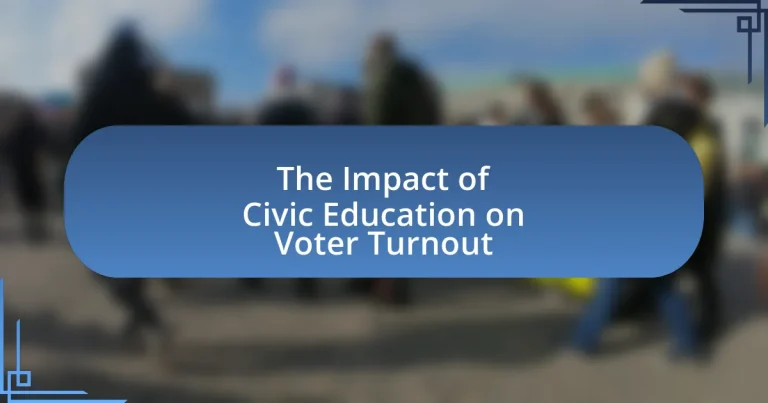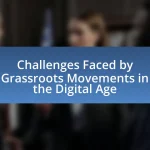Civic education plays a crucial role in increasing voter turnout by providing individuals with the knowledge and skills necessary for active participation in the electoral process. Research indicates that those who receive civic education are significantly more likely to understand their rights and responsibilities as voters, leading to higher engagement in elections. Key components of effective civic education include knowledge of government structures, civic rights, and critical thinking skills, all of which contribute to informed decision-making at the ballot box. The article explores the impact of civic education on voter awareness, the importance of voter turnout for democracy, and various methods of delivering civic education, highlighting the direct correlation between informed citizens and increased electoral participation.
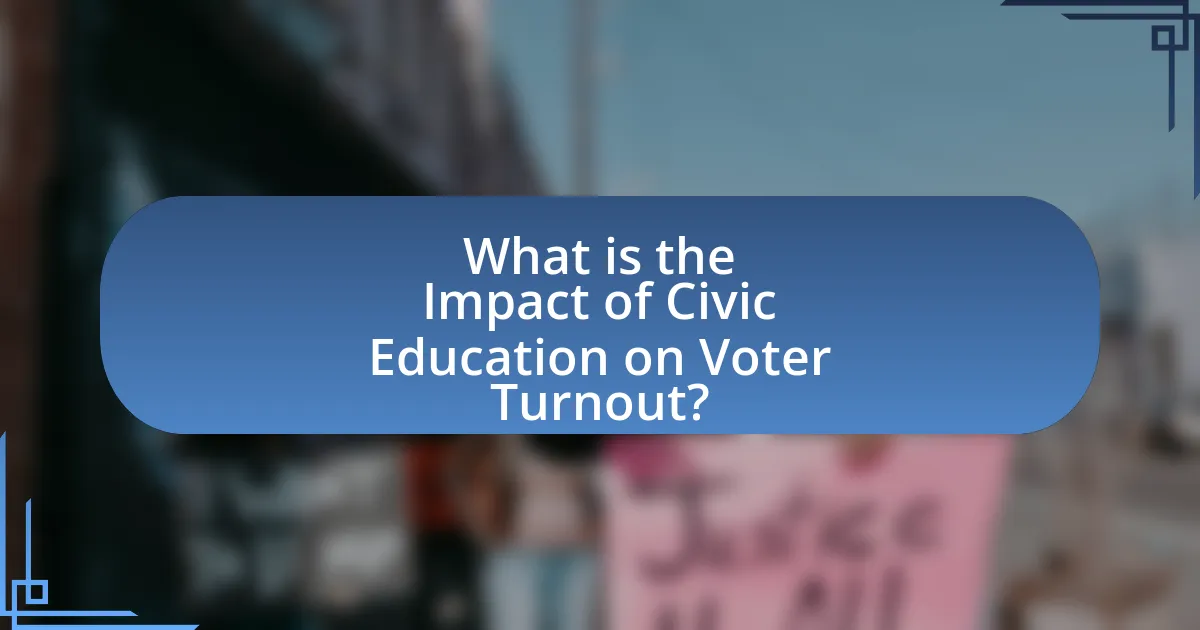
What is the Impact of Civic Education on Voter Turnout?
Civic education significantly increases voter turnout by equipping individuals with the knowledge and skills necessary to participate in the electoral process. Studies show that individuals who receive civic education are more likely to understand their rights and responsibilities as voters, leading to higher engagement in elections. For instance, a report by the National Assessment of Educational Progress found that students who received civic education were 20% more likely to vote in subsequent elections compared to those who did not. This correlation highlights the effectiveness of civic education in fostering informed and active citizenship, ultimately contributing to increased voter participation rates.
How does civic education influence voter awareness?
Civic education significantly enhances voter awareness by equipping individuals with knowledge about their rights, the electoral process, and the importance of participation in democracy. Studies show that individuals who receive civic education are more likely to understand how to register to vote, the significance of their vote, and the impact of government policies on their lives. For instance, research conducted by the Center for Information & Research on Civic Learning and Engagement (CIRCLE) indicates that students who participate in civic education programs are 20% more likely to vote compared to those who do not receive such education. This correlation underscores the role of civic education in fostering informed and engaged citizens, ultimately leading to higher voter turnout.
What are the key components of civic education that affect voter awareness?
The key components of civic education that affect voter awareness include knowledge of government structures, understanding of civic rights and responsibilities, and skills for critical thinking and civic engagement. Knowledge of government structures equips individuals with an understanding of how political systems operate, which is essential for informed voting. Understanding civic rights and responsibilities fosters a sense of duty and empowerment among citizens, encouraging them to participate in elections. Skills for critical thinking and civic engagement enable individuals to analyze political information critically, assess candidates and policies, and make informed decisions at the ballot box. Research indicates that comprehensive civic education programs significantly enhance voter turnout by increasing awareness and understanding of these components.
How does increased awareness lead to higher voter turnout?
Increased awareness leads to higher voter turnout by informing citizens about the electoral process, candidates, and issues at stake, which motivates them to participate. Research indicates that individuals who receive civic education are more likely to understand their rights and the importance of their vote, resulting in increased engagement. For instance, a study by the National Conference on Citizenship found that civic education programs can increase voter turnout by as much as 20%. This correlation demonstrates that when people are more informed, they are more likely to recognize the significance of their participation in elections, ultimately driving higher turnout rates.
Why is voter turnout important for democracy?
Voter turnout is crucial for democracy because it reflects the level of public engagement and legitimacy of the electoral process. High voter turnout indicates that citizens are actively participating in governance, which strengthens democratic institutions and ensures that elected representatives reflect the will of the people. For instance, in the 2020 U.S. presidential election, voter turnout reached approximately 66.8%, the highest rate for a presidential election since 1900, demonstrating a strong public interest in political participation. This engagement is essential for accountability, as elected officials are more likely to respond to the needs and concerns of an active electorate.
What role does civic engagement play in a healthy democracy?
Civic engagement is essential for a healthy democracy as it fosters active participation of citizens in political processes. This participation enhances accountability, encourages informed decision-making, and strengthens the legitimacy of governmental institutions. For instance, research by the National Civic League indicates that communities with higher levels of civic engagement experience increased voter turnout, which is a critical indicator of democratic health. Furthermore, studies show that civic education programs significantly boost voter participation rates, demonstrating a direct link between informed citizenry and democratic engagement.
How does low voter turnout impact democratic processes?
Low voter turnout undermines democratic processes by diminishing the representativeness of elected officials and weakening the legitimacy of the electoral system. When fewer citizens participate in elections, the elected government may not accurately reflect the will of the populace, leading to policies that do not align with the majority’s interests. For instance, in the 2016 U.S. presidential election, approximately 58% of eligible voters cast ballots, resulting in a significant portion of the electorate being unrepresented in the decision-making process. This lack of participation can also foster political apathy and disengagement, further perpetuating low turnout in future elections.
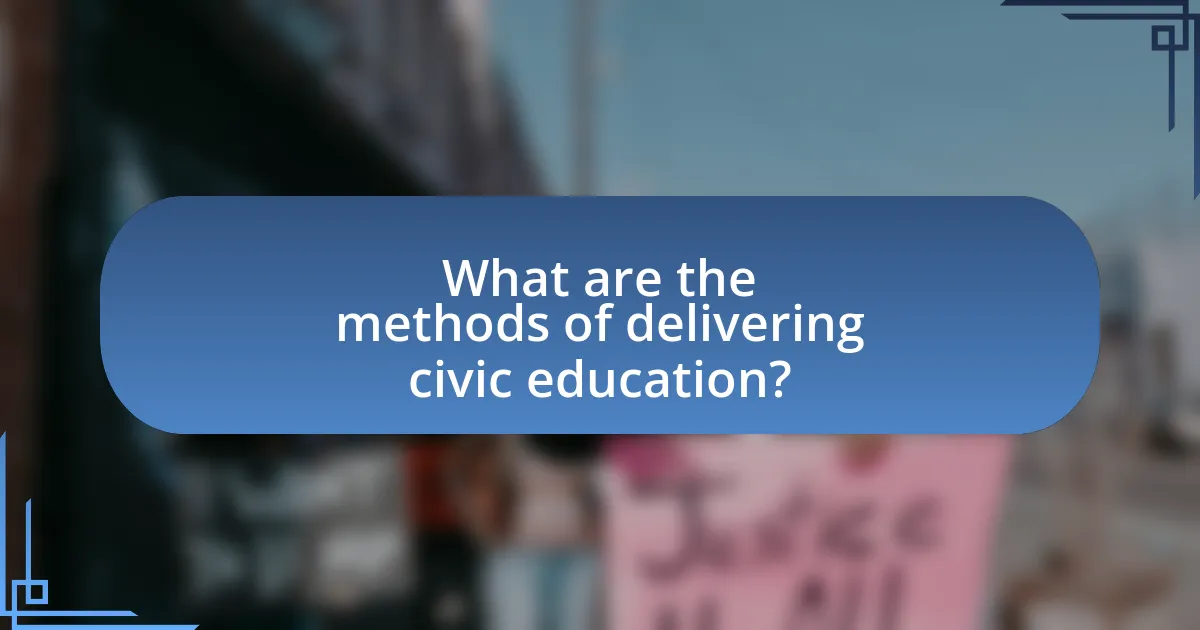
What are the methods of delivering civic education?
The methods of delivering civic education include formal education, community programs, online resources, and experiential learning. Formal education typically occurs in schools through curricula that cover government, rights, and responsibilities, which has been shown to increase civic knowledge and engagement. Community programs often involve workshops and seminars that encourage active participation in local governance, fostering a sense of responsibility among citizens. Online resources, such as educational websites and social media campaigns, provide accessible information and promote civic engagement, particularly among younger demographics. Experiential learning, including simulations of democratic processes and participation in civic activities, enhances understanding and retention of civic concepts, thereby positively influencing voter turnout.
How do schools implement civic education programs?
Schools implement civic education programs by integrating them into the curriculum through dedicated courses, extracurricular activities, and community engagement projects. These programs often include lessons on government structure, civic responsibilities, and the electoral process, aiming to foster informed and active citizenship among students. Research indicates that students who participate in civic education are more likely to vote; for instance, a study by the Center for Information and Research on Civic Learning and Engagement found that civic education significantly increases voter turnout among young adults.
What curriculum components are essential for effective civic education?
Essential curriculum components for effective civic education include knowledge of government structures, understanding of civic rights and responsibilities, critical thinking skills, and engagement in community service. Knowledge of government structures equips students with an understanding of how local, state, and federal systems operate, which is crucial for informed participation in democracy. Understanding civic rights and responsibilities fosters awareness of individual roles within society, promoting active citizenship. Critical thinking skills enable students to analyze political issues and evaluate information critically, which is vital for making informed voting decisions. Engagement in community service provides practical experience in civic involvement, reinforcing the importance of participation in democratic processes. These components collectively enhance civic competence, which research shows is linked to increased voter turnout. For instance, studies indicate that students who receive comprehensive civic education are more likely to vote in elections, demonstrating the direct impact of these curriculum components on civic engagement.
How do extracurricular activities enhance civic education?
Extracurricular activities enhance civic education by providing practical experiences that foster civic engagement and social responsibility. Participation in clubs, sports, and community service projects encourages students to develop skills such as teamwork, leadership, and communication, which are essential for active citizenship. Research indicates that students involved in extracurricular activities are more likely to vote and participate in civic activities, as these experiences cultivate a sense of belonging and commitment to their communities. For instance, a study by the National Conference on Citizenship found that youth who engage in extracurricular activities demonstrate higher levels of civic knowledge and are more likely to be involved in civic life, thereby reinforcing the connection between these activities and effective civic education.
What role do community organizations play in civic education?
Community organizations play a crucial role in civic education by facilitating access to information and resources that empower individuals to engage in democratic processes. These organizations often conduct workshops, provide materials, and create platforms for discussion, which enhance understanding of civic responsibilities and rights. For instance, studies have shown that community-led initiatives can increase voter turnout by as much as 10% by educating citizens about the voting process and the importance of participation in elections. This direct engagement fosters a more informed electorate, ultimately contributing to higher levels of civic participation and stronger democratic governance.
How do community programs increase voter participation?
Community programs increase voter participation by providing education, resources, and mobilization efforts that engage citizens in the electoral process. These programs often include workshops, informational sessions, and outreach initiatives that inform individuals about the voting process, deadlines, and the importance of their vote. For instance, research from the U.S. Census Bureau indicates that communities with active voter engagement programs see a turnout increase of 5-10% compared to those without such initiatives. Additionally, community programs often collaborate with local organizations to reach underrepresented populations, ensuring that diverse voices are heard and encouraging participation among groups that historically have lower turnout rates.
What partnerships can enhance civic education efforts?
Partnerships between educational institutions, non-profit organizations, and government agencies can significantly enhance civic education efforts. Educational institutions provide the framework for curriculum development, while non-profit organizations often have the resources and outreach capabilities to engage communities effectively. Government agencies can offer support through funding and policy initiatives that prioritize civic education. For instance, the collaboration between the National Education Association and local civic organizations has led to increased civic engagement programs in schools, demonstrating that such partnerships can lead to higher voter turnout by fostering informed and active citizenship.
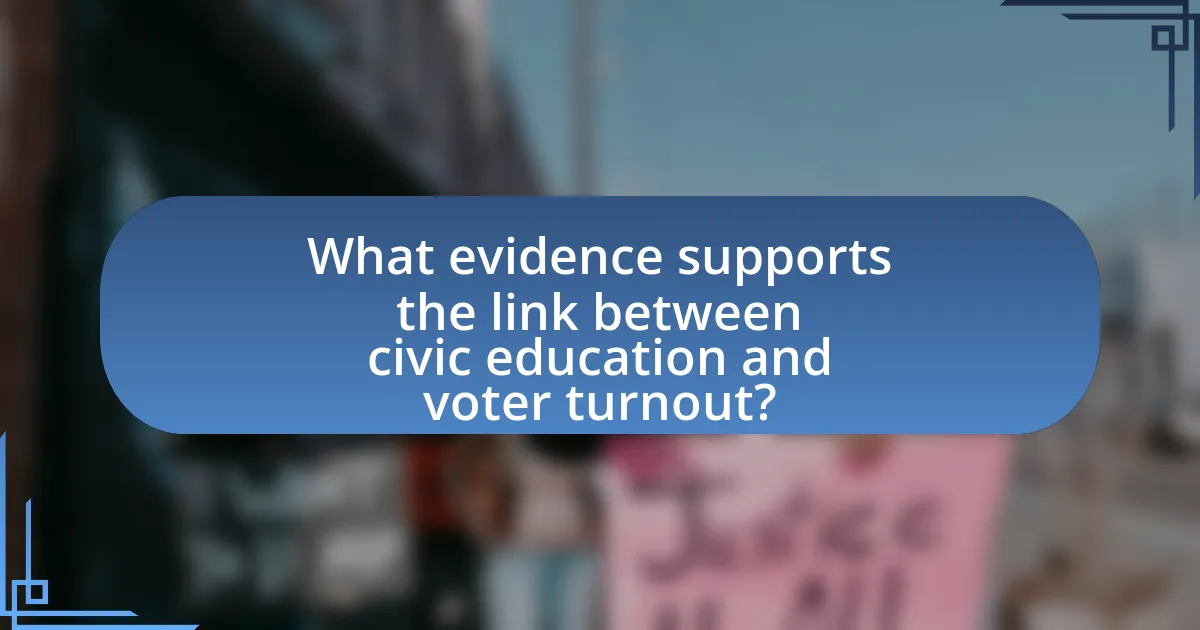
What evidence supports the link between civic education and voter turnout?
Civic education significantly increases voter turnout, as evidenced by various studies showing that individuals who receive civic education are more likely to participate in elections. For instance, research conducted by the Center for Information and Research on Civic Learning and Engagement (CIRCLE) found that high school students who participated in civic education programs had a 20% higher likelihood of voting compared to their peers who did not receive such education. Additionally, a study published in the Journal of Political Science Education demonstrated that college students exposed to civic engagement initiatives were 15% more likely to vote in the subsequent elections. These findings consistently highlight the positive correlation between civic education and increased voter participation.
What studies have been conducted on civic education and its effects on voting behavior?
Numerous studies have examined the relationship between civic education and voting behavior, demonstrating that effective civic education positively influences voter turnout. For instance, a study by the Center for Information & Research on Civic Learning and Engagement (CIRCLE) found that high school students who received comprehensive civic education were 20% more likely to vote in subsequent elections compared to those who did not receive such education. Additionally, research published in the Journal of Political Science Education indicated that students who participated in civic engagement programs showed increased political knowledge and a higher likelihood of voting. These findings underscore the critical role that civic education plays in fostering informed and active citizens, ultimately enhancing democratic participation.
What are the findings of recent research on this topic?
Recent research indicates that civic education significantly enhances voter turnout among young adults. A study conducted by the Center for Information & Research on Civic Learning and Engagement (CIRCLE) in 2022 found that students who received comprehensive civic education were 20% more likely to vote in elections compared to their peers who did not receive such education. This correlation suggests that informed citizens are more engaged in the democratic process, as civic education equips them with the knowledge and skills necessary to participate effectively. Furthermore, the research highlights that civic education programs that include practical experiences, such as mock elections and community service, further increase engagement levels, reinforcing the importance of active participation in democracy.
How do demographic factors influence the effectiveness of civic education?
Demographic factors significantly influence the effectiveness of civic education by shaping individuals’ access to information, engagement levels, and perceptions of civic responsibilities. For instance, research indicates that younger individuals, who are often more engaged in digital platforms, may respond better to civic education delivered through online mediums compared to older demographics, who may prefer traditional methods. Additionally, socioeconomic status affects access to quality civic education resources; individuals from lower-income backgrounds may have less exposure to comprehensive civic education, leading to lower levels of civic engagement and voter turnout. Studies, such as those conducted by the National Assessment of Educational Progress, show that students from diverse racial and ethnic backgrounds often have varying levels of civic knowledge, which directly correlates with their likelihood to participate in elections. Thus, understanding these demographic influences is crucial for tailoring civic education programs to enhance their effectiveness across different population segments.
How can civic education be improved to boost voter turnout?
Civic education can be improved to boost voter turnout by integrating practical, hands-on experiences that engage students in the electoral process. Research indicates that programs incorporating simulations of voting and discussions about real-world political issues significantly enhance students’ understanding and interest in civic participation. For instance, a study by the Center for Information & Research on Civic Learning and Engagement (CIRCLE) found that students who participated in civic education programs that included experiential learning were 20% more likely to vote compared to those who received traditional instruction. This evidence underscores the effectiveness of active learning strategies in fostering a more informed and engaged electorate.
What innovative approaches can be adopted in civic education?
Innovative approaches that can be adopted in civic education include experiential learning, digital engagement, and community-based projects. Experiential learning, such as simulations of government processes or mock elections, allows students to actively participate and understand civic responsibilities. Digital engagement through online platforms and social media can enhance accessibility and reach younger audiences, fostering discussions on civic issues. Community-based projects encourage students to engage with local governance and social issues, promoting a sense of responsibility and connection to their communities. These methods have been shown to increase civic knowledge and participation, ultimately impacting voter turnout positively.
How can technology enhance civic education initiatives?
Technology can enhance civic education initiatives by providing interactive platforms that engage learners and facilitate access to information. For instance, online courses and mobile applications can deliver educational content on civic responsibilities and voting processes, making it more accessible to diverse populations. Research indicates that digital tools, such as social media campaigns, can effectively increase awareness and participation in civic activities, as evidenced by the 2018 U.S. midterm elections, where platforms like Facebook and Instagram played significant roles in mobilizing younger voters. Additionally, gamification of civic education through apps can improve retention of information and encourage active participation in democratic processes.
What practical steps can individuals take to promote civic education?
Individuals can promote civic education by engaging in community outreach programs that focus on teaching the principles of democracy and civic responsibility. These programs can include organizing workshops, seminars, and discussion groups that cover topics such as voting rights, government structure, and civic duties. Research indicates that informed citizens are more likely to participate in elections; for instance, a study by the National Civic League found that communities with active civic education initiatives saw a 20% increase in voter turnout. By facilitating access to information and encouraging dialogue, individuals can significantly enhance civic knowledge and participation in their communities.
How can community members engage in local civic education efforts?
Community members can engage in local civic education efforts by participating in workshops and forums that focus on civic responsibilities and rights. These events often provide essential information about the electoral process, local governance, and community issues, which can enhance understanding and encourage active participation in democracy. Research indicates that communities with robust civic education initiatives see higher voter turnout; for instance, a study by the National Civic League found that civic education programs can increase voter participation by up to 20%. By volunteering as facilitators or attendees in these programs, community members contribute to a more informed electorate, ultimately fostering a culture of civic engagement.
What resources are available for individuals to educate themselves and others about civic responsibilities?
Individuals can educate themselves and others about civic responsibilities through various resources such as online courses, community workshops, and educational websites. For instance, platforms like Coursera and edX offer courses on civic engagement and responsibilities, while organizations like the League of Women Voters provide workshops and materials focused on voter education and civic participation. Additionally, websites such as CanIVote.org offer information on voting rights and responsibilities, helping individuals understand their civic duties. These resources are validated by their widespread use in promoting civic education and increasing voter turnout, as evidenced by studies showing that informed citizens are more likely to participate in elections.
